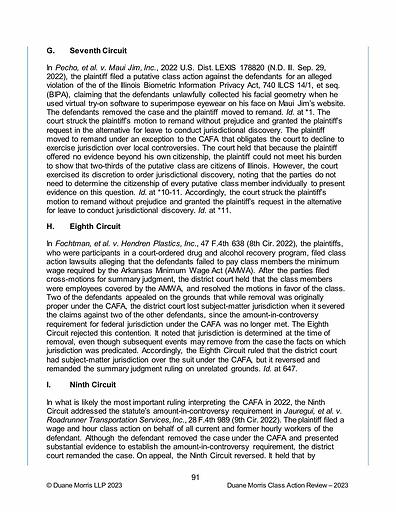Duane Morris Class Action Review - 2023 - Report - Page 91

and that the CAFA did not provide federal question jurisdiction. First, the court ruled that
the local controversy exception was satisfied because more than two-thirds of the
proposed class members were Louisiana citizens; all the defendants were Louisiana
citizens; the principal injuries resulting from the alleged conduct or any related conduct
of each defendant occurred in Louisiana; and no similar class action on behalf of the
same plaintiffs had been filed in the last three years. Id. at *17. Accordingly, the court
granted the plaintiffs’ motion to remand. Id. at *19.
F.
Sixth Circuit
In Kushner, et al. v. Nationstar Mortgage LLC, 2022 U.S. Dist. LEXIS 111701 (N.D.
Ohio June 23, 2022), the plaintiff filed a class action alleging that the defendant charged
improper fees related to residential mortgages. The named plaintiff lives in Cleveland,
Ohio. The defendant is a limited liability company, organized under the laws of
Delaware, with its principal place of business in Texas. The plaintiff filed his class action
complaint in the Cuyahoga County Common Pleas Court on March 7, 2022. Id. at *2.
On April 13, 2022, the defendant timely removed the case pursuant to the CAFA. In its
notice of removal, the defendant stated that it satisfied the CAFA removal requirements
because the parties were minimally diverse, there were at least 100 class members,
and the amount-in-controversy exceeded $5 million. Id. Noting that the plaintiff’s
amended complaint failed to state a specific amount-in-controversy, the defendant
asserted that, pursuant to Ohio law, the applicable calculation of damages was $250
per violation, which suggested that this particular matter could exceed $10 million in
damages, far in excess of the CAFA’s $5 million jurisdictional threshold. Id. at *3. On
April 14, 2022, the plaintiff filed a motion to remand. The court granted the plaintiff’s
motion to remand. The plaintiff’s motion challenged two points raised in the defendant’s
removal notice, including the number of class members and the amount-in-controversy.
Specifically, the plaintiff argued that the defendant’s definition of the class was
inconsistent with the plain language in the amended complaint because the defendant
only provided the court with the number of individuals charged the fees and not, as a
true reading of the amended complaint indicated, the number of individuals charged
fees that were not limited to actual payments to any third parties or were in excess of
the amount paid to the government. Id. at *4-5. Turning to the CAFA analysis, the court
held that minimal diversity was present here. The court acknowledged that the
defendant’s assertion that 111,710 accounts were charged a third-party “conveyance
preparation fee” or a county recording fee during the relevant time period, and therefore
held that numerosity was met. Id. Finally, the court opined that the defendant did not
prove by the preponderance of the evidence that the amount-in-controversy exceeded
$5 million. While the defendant’s proposed multiplier exceeded $5 million, the court
noted that the class included only those who were improperly charged the fees, not
those who were charged fees generally. Id. at *9-10. Accordingly, the court granted the
plaintiff’s motion to remand. Id. at *11.
90
© Duane Morris LLP 2023
Duane Morris Class Action Review – 2023













